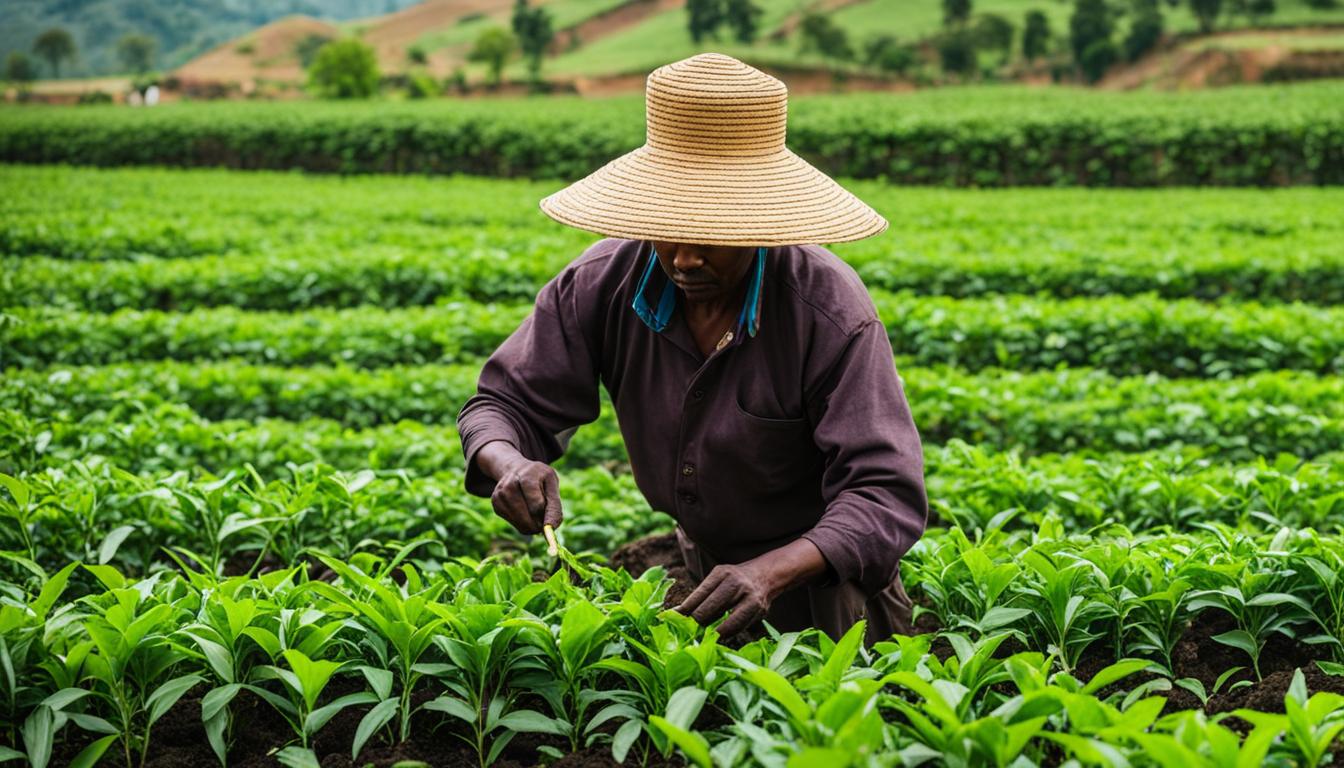Welcome to our article on improving soil health on tea farms. In this comprehensive guide, we will explore effective techniques and tips to enhance the quality and yield of tea by focusing on soil health. From understanding the importance of soil pH to the role of organic fertilizers, we will delve into the key practices that contribute to sustainable and organic tea farming. So let’s grab a cup of tea and dive into the world of soil health improvement!
Key Takeaways:
- Proper soil pH, ranging from 4.5 to 5.5, is vital for tea cultivation and yield.
- Soil acidification caused by chemical fertilizers can negatively impact tea yield and quality.
- Using organic fertilizers like sheep manure helps regulate soil acidification and improve soil health.
- Organic fertilizers promote soil microbial activity and enhance nutrient uptake by tea plants.
- Soil conservation practices and regular monitoring of soil health are essential for sustainable tea farming.
The Role of Organic Fertilizers in Soil Health Improvement
When it comes to improving soil health in tea farms, organic fertilizers play a crucial role. These natural alternatives to chemical fertilizers have been proven to effectively regulate soil acidification, enhance soil microbial activity, and improve nutrient uptake by tea plants. By incorporating organic fertilizers into tea plantation soil, farmers can ensure sustainable and organic ecological agriculture practices.
Various studies have focused on the use of organic fertilizers such as rapeseed cake, pig manure, sheep manure, and commercial organic fertilizer. These studies consistently demonstrate the ability of organic fertilizers to reduce soil acidification and improve both tea yield and quality. In addition to regulating soil pH, organic fertilizers promote the growth of beneficial soil microorganisms, increase soil enzyme activities, and provide essential nutrients for tea plants.
By choosing organic fertilizers over chemical alternatives, tea farmers can effectively remediate soil acidification, support thriving soil microbial communities, and enhance the overall health of their tea plantations. This commitment to organic practices aligns with the principles of ecological agriculture and contributes to the long-term sustainability and environmental well-being of tea farms.
Organic fertilizers offer a viable solution for tea farmers seeking to improve soil health and optimize tea production. The use of these natural alternatives not only benefits the soil and tea plants but also promotes organic farming practices that prioritize environmental stewardship and the production of high-quality, sustainable tea.

Soil Conservation Practices for Tea Cultivation
When it comes to tea cultivation, soil conservation is of utmost importance to ensure the long-term health and productivity of tea farms. Implementing effective soil erosion control measures is essential to prevent soil loss during planting and pruning. One such practice is the planting of cover crops, which help to maintain soil integrity and reduce erosion by protecting the soil surface from the impact of raindrops and wind. Additionally, establishing contour planting can help to slow down the flow of water down slopes, further preventing soil erosion.
Another key aspect of soil management in tea plantations is the use of soil amendments. Incorporating organic matter into the soil, such as compost or tea prunings, can improve soil structure and nutrient availability. This promotes healthy root development and enhances the overall fertility of the soil. Regular soil testing is also crucial to monitor the nutrient levels and pH of the soil, allowing farmers to make informed decisions about the application of fertilizers and amendments.
Furthermore, preserving and promoting soil biodiversity is essential for maintaining soil health in tea gardens. By preserving native vegetation and encouraging the presence of beneficial soil organisms, such as earthworms and microorganisms, farmers can enhance nutrient cycling and improve soil structure. This supports the growth and development of tea plants and contributes to the overall sustainability of tea farming.
| Soil Conservation Practices | Benefits |
|---|---|
| Planting cover crops | Protects soil surface from erosion |
| Establishing contour planting | Slows down water flow, reducing erosion |
| Incorporating organic matter | Improves soil structure and nutrient availability |
| Regular soil testing | Allows for informed fertilizer and amendment application |
| Preserving soil biodiversity | Enhances nutrient cycling and soil structure |
Monitoring Soil Health for Tea Cultivation
Monitoring soil health is a critical aspect of tea cultivation. By regularly assessing key parameters such as soil pH, nutrient levels, microbial and enzyme activities, tea farmers can make informed decisions to optimize soil conditions and ensure the success of their crops. Let’s take a closer look at the key aspects of soil health monitoring in tea plantations.
Soil pH
The pH level of the soil plays a crucial role in tea cultivation. It is recommended to maintain a pH range of 4.5 to 5.5 for optimal tea plant growth. Regular soil testing should be conducted to monitor the pH level and ensure it falls within the desired range. If the pH deviates significantly, appropriate measures such as applying lime or organic amendments can be taken to adjust the pH and create a favorable environment for tea plants.
Nutrient Levels
Understanding soil nutrient levels is essential for providing adequate nutrition to tea plants. Soil testing helps determine the concentration of essential nutrients such as nitrogen, phosphorus, and potassium. Based on the test results, farmers can apply fertilizers in the right proportions to address any nutrient deficiencies or imbalances. This targeted approach not only promotes healthy tea plant growth but also minimizes excessive fertilizer use, reducing the risk of nutrient runoff and environmental pollution.
Microbial and Enzyme Activities
Soil microorganisms and enzymes play a vital role in nutrient cycling and soil health. Monitoring microbial and enzyme activities provides valuable insights into the biological activity happening in the soil. Techniques such as measuring microbial biomass, enzyme assays, and biodiversity analysis can be employed to assess the overall health and functionality of the soil ecosystem. This knowledge helps tea farmers make informed decisions regarding soil amendments, organic matter incorporation, and other management practices to foster beneficial microbial communities and optimize soil health.
| Soil Parameter | Ideal Range | Monitoring Frequency |
|---|---|---|
| Soil pH | 4.5 – 5.5 | Every 6 months |
| Nutrient Levels | Varies based on crop requirements | Annually |
| Microbial and Enzyme Activities | Dependent on soil type and management practices | Periodically throughout the year |
By regularly monitoring soil health parameters, tea farmers can proactively address any imbalances or issues that may arise. This allows for timely interventions and adjustments in soil management practices, leading to healthier tea plants, increased yield, and improved overall sustainability of tea cultivation.
Improving Soil Structure in Tea Gardens
In order to maintain healthy and productive tea gardens, it is crucial to pay attention to soil structure. A well-structured soil not only promotes optimal plant growth but also improves water infiltration and nutrient availability. In this section, we will explore several key practices that can help improve soil structure in tea gardens.
Diving into Soil Compaction
Soil compaction is a common problem in tea gardens that can hinder root development and negatively impact plant growth. To avoid soil compaction, it is important to minimize the use of heavy machinery in tea cultivation. Additionally, ensuring that unpaved paths and tractor ways are covered with plant material can help prevent waterlogging and preserve soil structure.
Harnessing the Power of Organic Matter
Organic matter is a valuable resource for improving soil structure in tea gardens. Tea prunings, plant litter, and compost can be incorporated into the soil to enhance its texture and provide essential nutrients for tea plants. This practice not only improves drainage and aeration but also supports the growth of beneficial microorganisms, which further contribute to soil health.
Exploring the Benefits of Cover Crops
Cover crops, such as Guatemala grass or legumes, can be planted before tea cultivation to rehabilitate soils and increase soil organic carbon content. These crops help prevent soil erosion, improve soil structure, and provide additional organic matter. By incorporating cover crops into tea gardens, tea farmers can promote long-term soil health and enhance the sustainability of their farming practices.
| Benefits of Improving Soil Structure in Tea Gardens |
|---|
| Enhanced root development |
| Improved water infiltration |
| Increased nutrient availability |
| Reduced soil compaction |
| Promotion of beneficial microorganisms |
By implementing practices that focus on improving soil structure, tea farmers can create a conducive environment for tea plants to thrive. With enhanced root development, improved water infiltration, increased nutrient availability, and reduced soil compaction, tea gardens can achieve higher yields and better quality teas. Moreover, the promotion of beneficial microorganisms through the incorporation of organic matter and the use of cover crops contributes to the long-term sustainability of tea farming.
Soil Management Plans for Tea Plantations
Implementing comprehensive soil management plans is crucial for achieving sustainable tea production. At [Tea Farm Name], we are committed to organic farming and good agricultural practices to ensure the long-term health and productivity of our tea plantations.
Our soil management plans focus on maintaining soil fertility through the incorporation of organic matter. We regularly add tea prunings, plant litter, and compost to improve soil structure and provide essential nutrients for our tea plants. This practice not only enhances the health of the soil but also contributes to the overall sustainability of our tea farming operations.
We believe that prioritizing soil health is essential for producing high-quality tea while preserving the environment. By adhering to organic farming principles, we minimize the use of chemical fertilizers and pesticides, ensuring the purity and natural flavors of our teas.
In addition to organic matter incorporation, our soil management plans also include measures to promote soil conservation. We plant cover crops, such as Guatemala grass and legumes, to prevent soil erosion and increase the organic carbon content of the soil. Contour planting and the establishment of silt pits and drains further help in controlling soil erosion and maintaining the integrity of our tea plantations.
Regular monitoring of soil health is another important component of our soil management plans. We conduct soil testing at different intervals throughout the tea farming seasons to assess soil pH, nutrient levels, and microbial and enzyme activities. These insights enable us to make informed decisions about soil amendments, fertilizer applications, and other management practices.
At [Tea Farm Name], we are committed to continuous improvement and sustainable tea production. Our soil management plans play a key role in maintaining the health and productivity of our tea plantations, ensuring that we can continue to provide exceptional teas to our customers now and in the future.

Conclusion
In conclusion, improving soil health is vital for tea farms to achieve sustainable and organic agriculture practices. By implementing techniques such as using organic fertilizers, practicing soil conservation, monitoring soil health, and following comprehensive soil management plans, we can enhance soil fertility, prevent soil erosion, and promote sustainable tea farming.
By prioritizing soil health, we not only improve tea yield and quality, but also contribute to the preservation of the environment and the well-being of tea farmers and consumers. Sustainable tea farming ensures the long-term success and viability of tea cultivation.
So, let’s continue our journey towards sustainable tea farming, embracing organic agriculture, implementing soil conservation practices, and managing our soils responsibly. By doing so, we can create a more sustainable future for our tea farms and contribute to a healthier planet.
FAQ
Why is soil health important for tea farms?
Soil health is essential for tea farms as it directly impacts tea yield and quality. Maintaining optimal soil conditions ensures the proper growth and development of tea plants, leading to higher productivity and better-tasting tea.
How do organic fertilizers improve soil health on tea farms?
Organic fertilizers, such as sheep manure and rapeseed cake, regulate soil acidification and enhance soil microbial activity. They also provide essential nutrients for tea plants, promoting sustainable and organic agricultural practices on tea farms.
What are some soil conservation practices for tea cultivation?
Effective soil erosion control measures include planting cover crops, establishing contour planting, and constructing silt pits and drains. These practices help prevent soil loss during planting and pruning, ensuring soil health and sustainability in tea farming.
Why is monitoring soil health important for tea cultivation?
Regular monitoring of soil health allows tea farmers to make informed decisions about soil amendments, fertilizer applications, and other management practices. It helps maintain optimal soil conditions, nutrient levels, and microbial activity, ensuring the long-term success of tea cultivation.
How can tea gardens improve soil structure?
Tea gardens can improve soil structure by avoiding soil compaction, adding organic matter such as tea prunings and compost, and planting cover crops like Guatemala grass or legumes. These practices enhance water infiltration, root development, and overall soil health in tea gardens.
What should be included in a soil management plan for tea plantations?
A comprehensive soil management plan for tea plantations should include practices such as maintaining soil fertility through organic matter incorporation, managing soil erosion through cover crops and contour planting, and monitoring soil health through regular testing. Adhering to organic farming principles and good agricultural practices is also important.
How can tea farmers achieve sustainable and organic tea production?
By prioritizing soil health and implementing appropriate soil management strategies, such as using organic fertilizers, practicing soil conservation, and monitoring soil health, tea farmers can achieve sustainable and organic tea production. These practices contribute to the preservation of the environment and the well-being of tea farmers and consumers.
Source Links
- https://vietnamagriculture.nongnghiep.vn/organic-tea-production-aiming-to-restore-soil-health-d356200.html
- https://www.unilever.com/files/origin/36207ff71b3746ab511b0e235c4a17eeda3a6516.pdf/es_2003_sustainable_tea_good_agricultural_practice_guidelines_for-small-farmers.pdf
- https://www.frontiersin.org/articles/10.3389/fpls.2022.1055900





